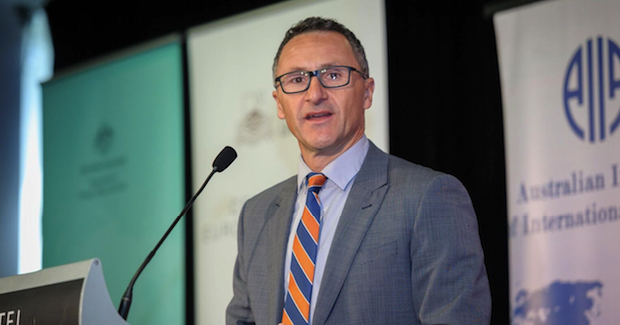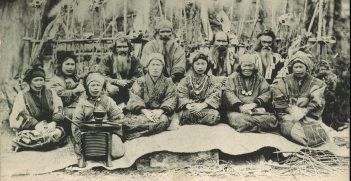Trump’s Election: An Ally’s Worst Nightmare

Donald Trump’s election has brought into sharp relief the need to fundamentally reassess Australia’s alliance with the US; although a change in the alliance is something the Greens have been calling for long before Trump’s election.
The election of someone like Trump is an ally’s worst nightmare. In January, the US will have as its leader a man who demeans women, who proposes to build walls, deport millions and prohibit people from entering the country based on their religion.
This is a man about whom the vast majority of Australia’s leaders have expressed sincere concern.
From a foreign policy perspective, this is a man who says climate change is a “hoax”, “perpetrated by the Chinese to make US manufacturing non-competitive”. He wants to withdraw the US from the Paris Agreement as soon as possible. The national security, refugee and diplomatic challenges that Trump was elected to solve will amplify a hundred-fold if he blindly marches towards a 4 degree temperature rise.
Donald Trump has promoted nuclear proliferation. He suggested that Japan and South Korea should acquire nuclear weapons—two countries with a troubled history. As former NSW Premier Bob Carr put it: “There has never been a person elected to the presidency who has had such a cavalier approach to nuclear weapons”.
He has praised authoritarian leaders such as Vladimir Putin and Kim Jong-Un, and has suggested he doesn’t care if there is a trade war with China.
In spite of the overwhelming evidence that the US under Donald Trump will be a dangerous ally (to pinch a phrase from Malcolm Fraser), the Turnbull government has lined up to fall right in behind him and our alliance with the US. The ALP’s recent calls for a sensible and adult conversation around our relationship with the US mark a welcome shift from their initial weak response to Trump’s election. But Senator Wong last week confirmed that there will continue to be strong ALP support for the US alliance, despite concerns she expressed about US values and interests under Trump.
Reassessing the fundamentals of the alliance
The Greens argue that it’s time for our nation’s leaders to debate the fundamentals of Australia’s alliance with the United States and not just tinker round the edges. We must not shy away from questioning an alliance that is 70 years old, or the opportunity to forge our own foreign policy path. Now is the time for us to end ANZUS and renegotiate the terms of our relationship with the US based on shared goals: for example on intelligence sharing and technology transfer.
Over the course of our alliance, we have been the US’s biggest backers. Australia is the only nation to have joined the US in every major military intervention in the past century: both world wars, Korea, Vietnam, the Gulf War, Afghanistan and Iraq.
Our disastrous venture following the US into war in Iraq, and the threat of future gung-ho support for a misguided America, underscores the need for parliamentary approval before Australia participates in any war. The Greens have long been trying to get support for this measure in parliament through a War Powers Bill.
What can we expect under a President Trump? It seems highly likely we will see an administration intent on prosecuting “peace through strength”. Just last week, Rudy Giuliani, alleged front-runner for secretary of state, said that Trump is committed to building a “gigantic” military force to thwart China’s ambitions in the Pacific, and to allow the US to fight a “two ocean war”.
So far, we know little about Trump’s plans in the South China Sea, but Giuliani’s comments and Trump’s temperament raise serious concerns, and some commentators have predicted he may make a quick show of force.
Where will this military posturing leave Australia, torn between its ally and its region and major trading partners? Peter Jennings at the Australian Strategic Policy Institute has suggested that the Trump administration would have a “higher expectation of allies”, and has argued that the US could exert greater pressure on Australia to increase our defence spending above the target of 2 per cent of GDP. That is around $15 billion more. Is that a price the Australian taxpayer would be willing to pay to be allied to Trump’s America? What do we sacrifice in domestic policy to pay for it?
And that $15 billion is additional to the enormous sums of money we are already throwing at maintaining the alliance. A whopping $17 billion allocated to acquire F-35 Joint Strike Fighters—which have been variously described as “a failure waiting to happen,” “an embarrassment” the “jackass of all trades and masterful of none”. More than $50 billion on 12 submarines—the largest procurement program in this nation’s history, all in the absence of an increase in direct threats to Australia. Rather than investing billions in defence, we should be putting taxpayer funds towards Australia’s critical infrastructure needs, like cleaning up our energy systems, improving public transport and modernising our cities and regions.
Australia may also be pressured to consider a greater US military presence, including possible placement of aircraft carriers and bombers. After all, you don’t build a 350-ship navy to keep it in port. A beefed-up US presence would not strengthen us, it would make us more vulnerable.
An independent foreign policy
In light of the threats presented by Trump’s election, the Greens are intensifying our calls to undertake a fundamental reassessment of the alliance. This is something we have been talking about for a long time.
In failing to pursue an independent foreign policy, we renounce our ambition to be a confident 21st century country and undermine our own national interests. As Malcolm Fraser put it: “we have become so enmeshed with America’s strategic aims that we jeopardise our own future security and important bilateral relationships in the region.”
We need to deepen our ties with our Asian neighbours, as many commentators have said in the last week. Paul Keating put it well when he said that Australia should not “put all its chips” on its relationship with the US, and that a wise country hedges its bets.
A confident Australia
But we need to do more than just improve our ties with Asia. We need an independent, confident and courageous Australia—one that respects international law, protects human rights, and advocates for our values.
We have precedent for this—Australia hasn’t always limited its global influence via its relationship with the US.
As former Australian Ambassador to China Stephen FitzGerald has reflected, Gough Whitlam enraged Washington when he spoke out publicly against the 1972 Christmas bombings of Hanoi, “but, like it or not, in the end America accepted his re-framing of relations”.
When our leaders stand independently, show courage and articulate a clear vision, we have shown we can punch above our weight in the world. It’s evident in Australia’s successes at the United Nations Security Council under foreign ministers of various political stripes. And New Zealand, unshackled from its US alliance in the 80s, has championed the cause of nuclear disarmament and is now serving on the Security Council.
Underpinning this independence and courage must be an understanding that we cannot shirk our responsibilities to the rest of the world. We’re currently in the midst of an unprecedented retreat—on our commitments to human rights, asylum seekers, on foreign aid, multinational tax avoidance, on global warming and clean energy investment.
Take foreign aid, for example, where Australia has slashed the budget by over $11 billion since 2013; or our shameful refugee policy, where our government is still spending billions to keep desperate people locked up on Manus Island and Nauru.
This is an extract from Senator Richard Di Natale’s address to the AIIA’s 2016 National Conference. Senator Di Natale is the leader of the Australian Greens. The full transcript of his speech is available here.
This extract is published under a Creative Commons Licence and may be republished with attribution.




